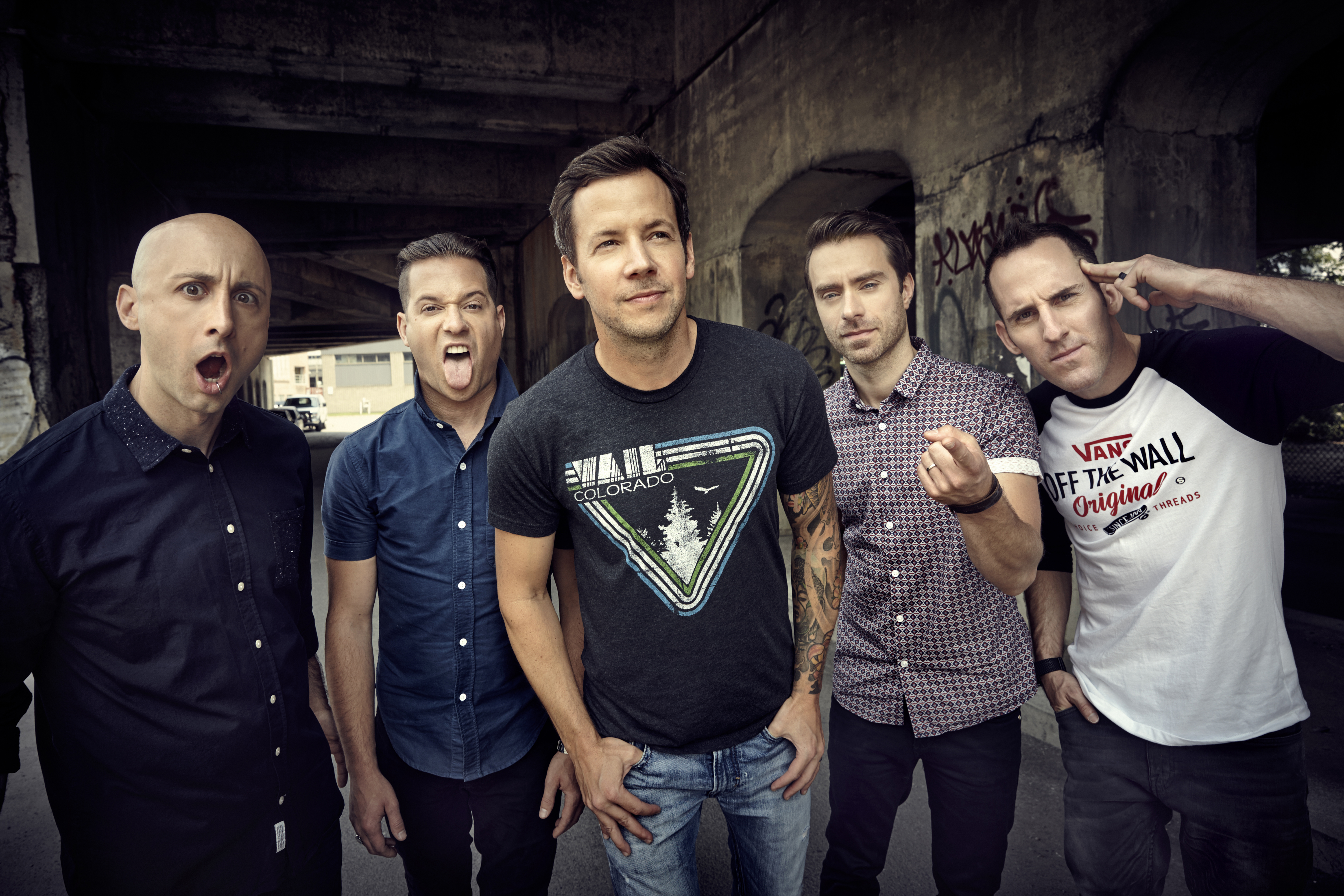Biography
Just after wrapping up a two-year-long tour in support of 2011’s Get Your Heart On!, multi-platinum-selling pop-punk band Simple Plan spent another two tireless years creating a follow-up album that captures the classic Simple Plan spirit but boldly stretches the limits of their sound. “One of the reasons we’re still here today is that we’ve never done just what people expect us to—we’ve never been afraid to try something different, ” says drummer Chuck Comeau, who co-founded the Montreal-bred band in 1999. “We’re proud of our pop-punk roots and we we’ll never turn our backs on them, but we also like to take chances, surprise our fans, and always keep them guessing on what we’ll do next.”
Just after wrapping up a two-year-long tour in support of 2011’s Get Your Heart On!, multi-platinum-selling pop-punk band Simple Plan spent another two tireless years creating a follow-up album that captures the classic Simple Plan spirit but boldly stretches the limits of their sound. “One of the reasons we’re still here today is that we’ve never done just what people expect us to—we’ve never been afraid to try something different,” says drummer Chuck Comeau, who co-founded the Montreal-bred band in 1999. “We’re proud of our pop-punk roots and we we’ll never turn our backs on them, but we also like to take chances, surprise our fans, and always keep them guessing on what we’ll do next.”
The result: Taking One for the Team, Simple Plan’s fifth full-length and most ambitious album so far, offering hard-hitting punk-fueled tracks alongside songs that delve into everything from reggae to delicate acoustic balladry. “We’re a pop-punk band at the core and we’ll always want to create those big, anthemic rock songs, but there’s also a part of us that loves other types of sounds, other types of music,” frontman Pierre Bouvier points out.
On Taking One for the Team, that sonic exploration yielded tracks like “I Don’t Wanna Go to Bed,” a massive pop gem featuring guest vocals from rapper Nelly (as well as a Baywatch-inspired video starring David Hasselhoff himself). “That song was a big departure for us and it was a little scary, but we kept going back to it,” says Comeau. “Finally it was like, ‘Let’s not hold back—it feels good, so let’s just go for it.’” Another supremely feel-good moment: “Singin’ in the Rain,” which matches its whistled melodies and breezy reggae rhythm with what Bouvier calls “a positive, self-empowering message about living in the world today, where shit is bad and the news is depressing. It’s saying, ‘We all have issues but hey, we’re gonna get through it because it’s our only choice. Might as well smile and try to enjoy ourselves while we’re alive.’”
Longtime fans can rest assured that Taking One for the Team is packed with plenty of quintessential Simple Plan tracks, including “Boom,” whose companion music video features cameos by members of All-Time Low, Pierce The Veil, PVRIS, MxPx, and many more Warped Tour all-stars. The album starts out full-throttle with the brutal guitar and furious drumming of “Opinion Overload.” “It’s a song about following your heart and dreams no matter what people say or think,” explains Bouvier. “We’re adults in our mid-thirties now, and we still have to deal with that. Sometimes you gotta remind yourself that it doesn’t mean anything, that it’s ok to stand up for yourself and be who you are and that’s what’s gonna set you apart.” That same defiant spirit is present on “I Refuse,” where Simple Plan mine inspiration from punk/hardcore acts like Rise Against and Good Riddance, ultimately delivering the only punk anthem in recent memory to feature an elegant piano interlude. “We grew up on that kind of music; it’s in our DNA— we’ll always need that energy and those super-fast, in-your-face songs that people love about this band,” says bass player David Desrosiers of tracks like “I Refuse” or “Nostalgic”. “I can already imagine us playing those songs live and seeing the crowd go crazy, singing along to every word.”
True to Simple Plan’s heartfelt sensibilities, Taking One for the Team also serves up songs like the stripped-back and quietly haunting “Problem Child.” “That one’s written from the perspective of my brother, who’s gone through some tough times and had some troubles,” notes Comeau. “It’s one of the most personal songs I’ve ever written with Pierre, and I think it’ll be relatable to fans who are dealing with trying to find their own way in life.” On “Perfectly Perfect” (a tender, acoustic-guitar-driven number co-written with Plain White T’s frontman Tom Higgenson), Simple Plan shift their focus to everyday struggles with self-perception. “I think most people have a distorted view of themselves,” says Bouvier. “We all obsess about little things that bother us about ourselves, when most people wouldn’t even notice or might actually find them charming.”
For the recording of Taking One for the Team, Simple Plan collaborated with producer Howard Benson, best known for his work on groundbreaking albums like My Chemical Romance’s Three Cheers for Sweet Revenge and the All-American Rejects’ Move Along. The studio sessions were what guitarist Jeff Stinco calls “a true team-effort” and gave the band a chance to bond, both musically and as friends: “We immersed ourselves in the process and shared ideas with each other non-stop. We all stayed together in the same house while recording the album, and we lived and breathed those songs for months, just like we did when we made our first record No Pads, No Helmets…Just Balls. It was awesome and I think that’s why the album sounds the way it does.”
Prior to the band heading into Benson’s studio, Bouvier and Comeau dedicated a year and half to writing together, often spending 12 hours a day holed up in their Southern California home studios. “Some days, writing a simple piece of music felt like climbing Mount Everest, and then other days a song would come to us and—just like that, with hardly any effort—we’d have something pretty cool and memorable,” recalls Bouvier. “Chuck would come up with a lyric and I’d close my eyes and just hear the song, and then we’d spit it right out. It’s bizarre.”
Throughout the intense and sometimes grueling songwriting process for Taking One for the Team, Simple Plan stayed energized by pursuing their passion for both punk rock and pop music. “We’ve always lived with one foot in each world, to the point where one day we’re playing festivals next to super-heavy bands like Slipknot or seminal punk bands like Bad Religion and the next we’re performing with acts like One Direction,” says Comeau. “It’s weird, but that dichotomy is who we are; we love each style of music, and we’d be cheating ourselves if we didn’t follow our hearts and chase them both when we’re writing songs.” That merging of pop and punk not only stokes Simple Plan’s creativity, but also proves essential in forging a singular sound that’s charged with gritty, gut-punching power but built on big hooks and brightly infectious melodies. And the band cannot wait to bring that sound on the road as the group prepares to embark on a major globe-spanning tour following the release of the new album: “This band really comes alive on stage. We’ve always had a strong connection with our fans and being able to feed off their energy is essential to us. We’ve spent so much time working on the album and now that it’s ready, we just can’t wait to start playing shows again and perform the new songs live,” comments guitarist Sebastien Lefebvre.
In naming the new album, Simple Plan chose a title that reflected another driving force behind the band: the unshakeable sense of camaraderie that’s guided them from their formation to their 2002 double-platinum debut No Pads, No Helmets…Just Balls to sold-out tours in nearly every corner of the planet. “We’ve been through so much as a band; we’ve had ups and downs, triumphs and defeats, and we’ve all made sacrifices, but in 17 years the team’s never changed,” says Comeau. “Nobody got traded, nobody retired. We’re all still here together.” Along with their naturally potent chemistry, that longevity’s got much to do with Simple Plan’s shared commitment to endlessly evolving in their music. “One of the things I’m most proud of is that, even though the band’s been going for so long, we still have that same spirit as when we started,” says Bouvier. “We look at ourselves as the underdogs that still have things to prove. We never take the easy road—we always challenge ourselves and put our hearts into it 100 percent. And because of that, we’re always able to look back and know that, no matter what happens, there’s no way we could have given anything more.”


